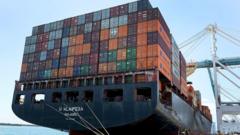A recent emergency move by the British government to intervene in a Chinese-owned steel mill signals significant challenges in strengthening relations with China amid ongoing trade tensions.
Crisis at British Steel Mill Strains UK-China Relations

Crisis at British Steel Mill Strains UK-China Relations
A British steel mill dispute raises doubts on improving diplomatic ties with China.
Britain’s recent efforts to strengthen ties with China, which included high-level visits from senior officials, have been overshadowed by an ongoing crisis at a Chinese-owned steel mill located in Scunthorpe, Lincolnshire. As part of a calculated charm offensive, the British government aimed to improve relations with China, particularly in the context of a shifting global trade framework influenced by the U.S. under President Trump.
However, British Parliament's emergency decision last weekend to take control of the steel mill has created tension, potentially jeopardizing Prime Minister Keir Starmer's ambitions for a warmer bilateral relationship. This intervention comes following the Chinese company's neglect to provide necessary subsidies that would keep the mill operational, risking the loss of about 2,700 jobs and Britain's access to a vital resource.
The situation escalated when accusations of bad faith were leveled against the Chinese owner, Jingye, for allegedly failing to procure essential raw materials needed for the mill's operation. In a recent interview with Sky News, Jonathan Reynolds, the business secretary, expressed caution regarding future cooperation with Chinese companies in the steel sector, indicating a potential shift in Britain's approach to foreign investments in critical industries.
Reynolds emphasized the importance of evaluating which sectors should be open to foreign investment and hinted at a more protective stance towards Britain's strategic industries, suggesting that bringing Chinese firms into sensitive markets like steel could be reconsidered. The steel mill crisis has raised urgent questions about the robustness of Britain's commitment to forging a constructive relationship with China against a backdrop of increasing economic protectionism.
However, British Parliament's emergency decision last weekend to take control of the steel mill has created tension, potentially jeopardizing Prime Minister Keir Starmer's ambitions for a warmer bilateral relationship. This intervention comes following the Chinese company's neglect to provide necessary subsidies that would keep the mill operational, risking the loss of about 2,700 jobs and Britain's access to a vital resource.
The situation escalated when accusations of bad faith were leveled against the Chinese owner, Jingye, for allegedly failing to procure essential raw materials needed for the mill's operation. In a recent interview with Sky News, Jonathan Reynolds, the business secretary, expressed caution regarding future cooperation with Chinese companies in the steel sector, indicating a potential shift in Britain's approach to foreign investments in critical industries.
Reynolds emphasized the importance of evaluating which sectors should be open to foreign investment and hinted at a more protective stance towards Britain's strategic industries, suggesting that bringing Chinese firms into sensitive markets like steel could be reconsidered. The steel mill crisis has raised urgent questions about the robustness of Britain's commitment to forging a constructive relationship with China against a backdrop of increasing economic protectionism.





















